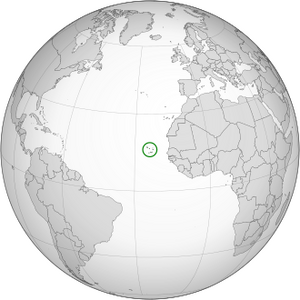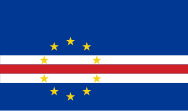Cabo Verde: Difference between revisions
(Created page with "{{Header|Cabo Verde 10/24}} {{infobox country | country = Republic of Cabo Verde | map = Cape_Verde_(orthographic_projection).png | flag = Flag_of_Cape_Verde.png | flagof = Flag of Cabo Verde | website = | embassy = | capital = Praia<br>(and {{PAGENAMEE}}'s largest city) | largest = | rl = | ac = +238 | cc = CV | lang = Portuguese, Cape Verdean, Creole | curr = Cape Verdean escudo (CVE) | side = right }} {{abr-50|Oct, 2024}} Category:...") |
(No difference)
|
Revision as of 19:27, 5 October 2024
| Republic of Cabo Verde |
|
(and Cabo_Verde's largest city) |
Source information is available at [ Sources ] |
Cape Verde or Cabo Verde, officially the Republic of Cabo Verde, is an archipelago and island country of West Africa in the central Atlantic Ocean, consisting of ten volcanic islands with a combined land area of about 4,033 square kilometers (1,557 sq mi). These islands lie between 600 and 850 kilometers (320 and 460 nautical miles) west of Cap-Vert, the westernmost point of continental Africa. The Cape Verde islands form part of the Macaronesia ecoregion, along with the Azores, the Canary Islands, Madeira, and the Savage Isles.
The Cape Verde archipelago was uninhabited until the 15th century, when Portuguese explorers discovered and colonized the islands, thus establishing the first European settlement in the tropics. Because the Cape Verde islands were conveniently located to play a role in the Atlantic slave trade, Cape Verde became economically prosperous during the 16th and 17th centuries, attracting merchants, privateers, and pirates. It declined economically in the 19th century after the suppression of the Atlantic slave trade by the British Empire, and many of its inhabitants emigrated during that period. However, Cape Verde gradually recovered economically by becoming an important commercial center and practical stopover point along significant shipping routes. Cape Verde became independent in 1975.
Since the early 1990s, Cape Verde has been a stable representative democracy and has remained one of the most developed and democratic countries in Africa. Lacking natural resources, its developing economy is mostly service-oriented, with a growing focus on tourism and foreign investment. Its population of around 596,000 (as of 2022) is of primarily African and a minor European heritage and predominantly Roman Catholic, reflecting the legacy of Portuguese rule. A sizeable Cape Verdean diaspora community exists worldwide, especially in the United States and Portugal, considerably outnumbering the island's inhabitants. Cape Verde is a member state of the African Union.
Cape Verde's official language is Portuguese.[10] The recognized national language is Cape Verdean Creole, spoken by the vast majority of the population. As of the 2021 census, the most populated islands were Santiago, where the capital Praia is located (269,370), São Vicente (74,016), Santo Antão (36,632), Fogo (33,519), and Sal (33,347). The largest cities are Praia (137,868), Mindelo (69,013), Espargos (24,500), and Assomada (21,297).[11]
Spanking and Spanking Art in Cabo_Verde
In the 20th century, school corporal punishment fell out of fashion and was gradually banned in many countries, a trend that continues until the present day.
As of May 2008, Cabo Verde permits corporal punishment in schools.
( We have no further information from SAOTK as of Oct, 2024 )
( We have no further information from Corpun.com as of Oct, 2024 )
Prostitution in Cabo_Verde
- Prostitution in Cabo_Verde ↗ on Wikipedia
External links
- More information is available at [ Wikipedia:Cabo_Verde ]
Chat rooms • What links here • Copyright info • Contact information • Category:Root

